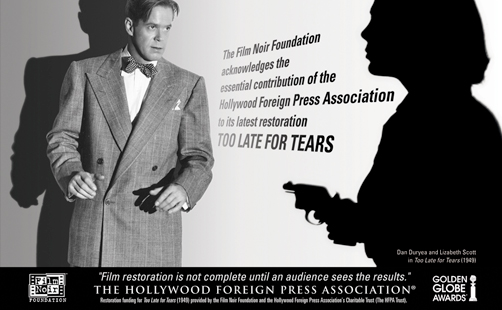
- Industry
NOIR RESTORATION: Too Late for Tears
The man speaking is a hood who comes to retrieve his lost bag of money, and ‘Tiger’, the woman he is talking to, is the one who found the bag and won’t let go. And you know right away that you are in film noir territory, where the women are indeed beautiful, and smart, and hard. The hood is Dan Duryea, “Tiger” is the lovely Lizabeth Scott, and the film is Too Late for Tears, (1949) which the HFPA helped restore, and which will have its restoration premiere on Saturday, January 25, 2014, at the historic Castro movie theater in San Francisco, during the opening weekend of NOIR CITY 12 film festival. The HFPA is not new to film restoration. It has been giving grants for this important cause for some 20 years now, but this grant is the first collaboration with the Film Noir Foundation, a non-profit dedicated to the research, restoration and showing of this, arguably the most American of film genres. Of which Too Late for Tears is a perfect example. It features a once-in a lifetime opportunity to get rich and the inevitable double crosses that ensue, a few corpses, and a quick slide to the final, devastating end. And then there is Scott, the beautiful, vicious, crafty and evil woman– who fools, manipulates and destroys the men in her life: meek husband Alan Palmer (Arthur Kennedy, Golden Globe winner for Trial, 1956) and the scheming cad Danny Fuller (played by Dan Duryea). In the sordid tale, Jane Palmer (Scott)—the original desperate housewife—refuses to turn over to the authorities the satchel filled with $60,000 that has been mistakenly thrown into her convertible. Soon scheming Duryea oozes into her life, looking to reclaim what’s wrongfully his. Scott’s straight-arrow husband Kennedy wants to wash his hands of the dirty money— but she just can’t let go, even if it means murder…
As a young stage actress and fashion model, husky voiced, with blond hair somewhere between Veronica Lake and Lauren Bacall, Scott was slated for stardom. She was often cast in film noirs, perhaps more than any other major actress. Sadly it all came to an end in 1955, when she sued the gossip magazine Confidential for writing that she spent her off-work hours with “Hollywood’s weird society of baritone babes” a code word then for lesbians. The suit was dismissed on a technicality but the damage was done, and the publicity generated by the story effectively ended Scott’s film career. Scott practically retired from the screen two years later amidst rumors that she was blacklisted.
For the next six decades Scott shunned publicity and was hardly seen or interviewed. Today, still striking at 92 years old, Scott is one of the last queens of noir still with us, and it will be a pleasure to see her again on the screen in the restored version of the film.
Tears is based on a novel by future television Hall of Fame author Roy Huggins (creator of 77 Sunset Strip, Maverick, The Fugitive, Baretta, etc.), who wrote his own brilliant screenplay. For many years, all the original 35mm prints were believed lost. Many of the versions on the market are degraded by bad editing and poor print quality, and that is why the Film Noir Foundation to put Tears at the top of their to do list. Now the “re-premiere” caps a five-year restoration effort and the HFPA, having sponsored the work with a grant, is proud to be a part of it. A happy ending for this almost lost classic, which Eddie Muller, noir maven and the head of the Film Noir Foundation calls “the best un-known American film noir of the classic era.”.
Yoram Kahana [gallery:3319]

